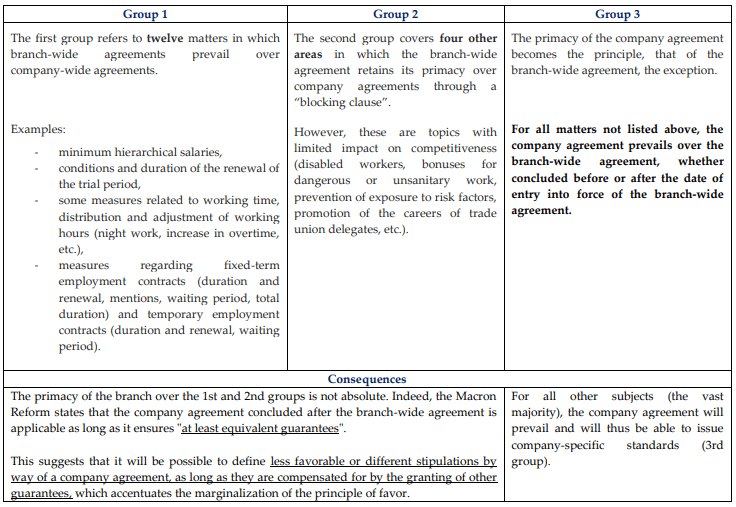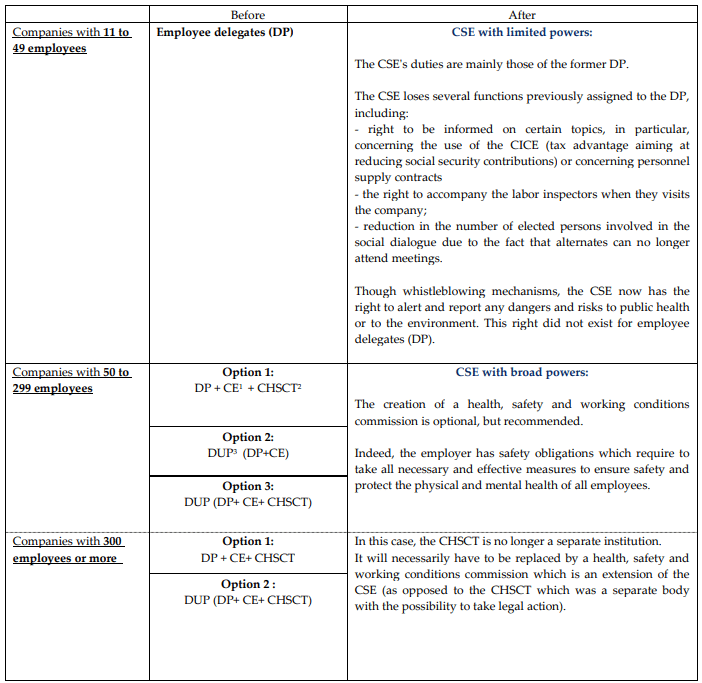1. The implementation of the Social and Economic Committee to replace the existing bodies
A single and mandatory body for all companies
After a number of successive reforms of the social dialogue, the French system, involving multiple staff representative bodies, (D.P, C.H.S.C.T, C.E) will have completely disappeared by the end of 2019. Although, until now, the law has stated that each body should act within specific boundaries, in practice, they have often tended to deal with the same subjects. In order to remedy this, a single staff body, called DUP, was introduced a few years ago in order to encourage companies to regroup. This law remained optional and limited to companies of a certain size.
The last step of the Macron Reform is the mandatory merger of all the current bodies into a single staff representative body called the Social and Economic Committee (CSE), which must be implemented before 1 January 2020 by all companies with 11 employees or more.
A response to the challenges faced by company heads
This modernization meets a longstanding demand from company heads, which:
- mitigates the “threshold effect” beyond 50 employees, which currently leads to numerous financial and social obligations and hinders hiring for many companies;
- reduce the costs of the current staff bodies (avoiding the accumulation of mandates; decreasing the number of employee representatives, the number of meetings and, consequently, the overall number of hours of delegation);
- reduce the number of interlocutors from many to just one, whose role is to improve communication between employee representatives and company heads.
A single unit with adaptable duties according to the size of the company
However, the reform does not increase the obligations of small businesses. This implies that the CSE, as an entity, will not have legal standing in companies with fewer than 50 employees. In this case, its responsibilities will be reduced (mainly taking over the former duties of employee delegates).
In companies with 50 employees or more, the CSE will have broader duties since it will incorporate the responsibilities and missions devolved to the former CHSCT and CE. Elected employee representatives will therefore gain in competency and flexibility allowing them to deal with all matters (economy, strategic orientation, working conditions, health, etc.).
Time for social dialogue to establish a tailor-made Committee
Negotiations will be pivotal to adapt the new role of the CSE to the needs of companies. A high-level social dialogue and in-depth analysis of internal requirements will enable companies to establish a bespoke CSE.
2. Overview of the staff representative bodies before and after the reform: innovation and continuity
3. How to benefit from the new negotiation rules in my company?
The running of the body can be adapted in each company in order to strengthen the effectiveness of the social dialogue (A) with the aim of reducing labor law rigidities though the conclusion of derogating “win-win” company agreements meeting the company’s operational needs (B).
A. Introducing a tailor-made CSE
The renewal of all company agreements on the former employee representative bodies
As part of the establishment of the CSE, all company agreements relating to the former employee representative bodies have expired. In the absence of a new negotiated agreement, the new CSE legal provisions shall automatically replace provisions of existing legal or collective agreements referring to the old representative bodies.
More favorable legal provisions in the absence of an agreement
These new legal provisions are less favorable to employee representative bodies: decrease in the number of employee representatives, number of successive mandates limited to 3, role of the alternate limited to replacing the titular, increasing request for the CSE’s operating budget due to the extension of the list of co-financed expert-assessments.
Greater bargaining power for employers
As a result, elected members will be much more willing to negotiate than in the past. The employer will therefore be allowed to think in terms of a “win-win” scenario in order to render the social dialogue and the running of the CSE within the company more flexible.
The following overview outlines the main possible CSE adjustments introduced by collective agreement:
- setting up of ” local representatives ” to ensure staff representation on the ground;
- adjustment of the attendance of alternates at certain meetings or committees in order to allow them to become involved in their role as employee representatives and to familiarize themselves with the functioning of the representative body;
- possible reduction of the number of meetings (with a minimum of 6 annual meetings);
- determination of the number and scope of separate facilities, enabling a single CSE to be set up at company level or, on the contrary, to organize the management of employee representative bodies according to the specific needs of each facility (subject to sufficient management autonomy);
- determination of the operating budget for social and cultural activities;
- definition of the content of information and ad-hoc consultations;
- methods for said ad-hoc consultations, including the number of meetings;
- reduction of the deadlines to deliver CSE opinions (in the past: minimum 15-day period) in case of ad-hoc consultations, on the condition that the deadline granted to the CSE allow it to exercise its competency effectively, depending on the nature and importance of the issues submitted to it;
- negotiation of the content of the Economic and Social Database (BDES)[4].
B. Organizing corporate standards to suit operational needs
The implementation of “win-win” company agreements is the key to flexible French labour law standards and to improve the competitiveness of companies.
The principle: Primacy of the company agreement
The “Macron Reform” extends the scope of primacy of the company agreement over the branch-wide agreement, thus allowing companies to adapt some regulations to their specific operating requirements:

Facilitation of restructuring through the conclusion of collective agreements
Lastly, apart from these three groups, “restructuring” measures are greatly facilitated when they are not conditioned on the conclusion of a collective company agreement. Economic difficulties, once required to make necessary changes, are no longer mandatory. One of the key measures of the Macron Reform, known as collective mutual termination, allows employers to negotiate with unions on the number of redundancies and the related social and financial conditions of departure.
Easier, cheaper and legally safer, the scope for employers to negotiate is now considerably wider.
Dr. Aymeric Le Goff and Alizée Poncet
[1] « Comité d’Entreprise » : Works Council
[2] « Comité d’Hygiène, de Sécurité, et des Conditions de Travail » : Health, safety and working conditions Committee
[3] « Délégation Unique du Personnel » : Single staff body
[4] Base de données économiques et sociales: a tool that makes it possible to gather the information required by recurring consultations of employee representative bodies.
